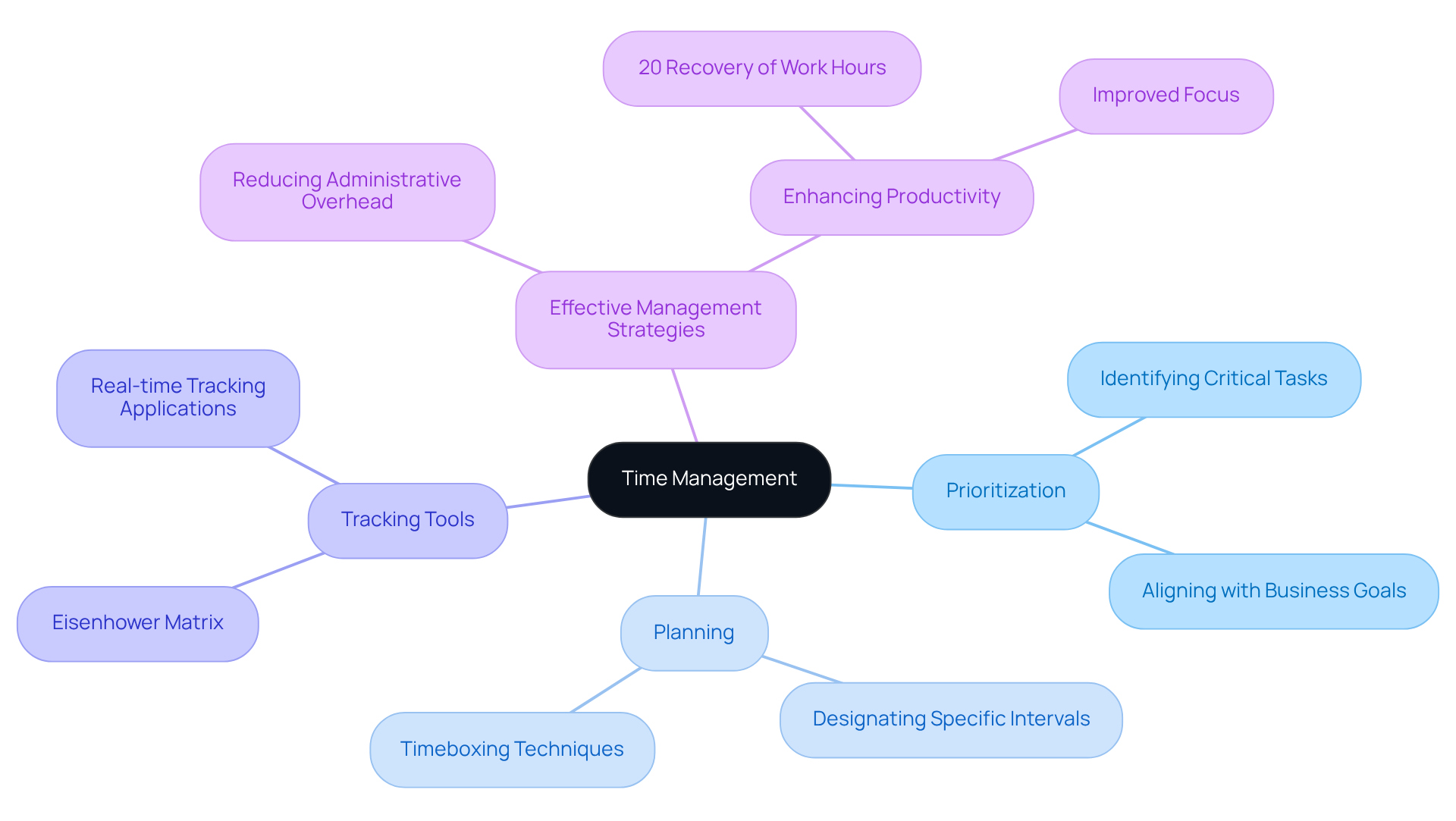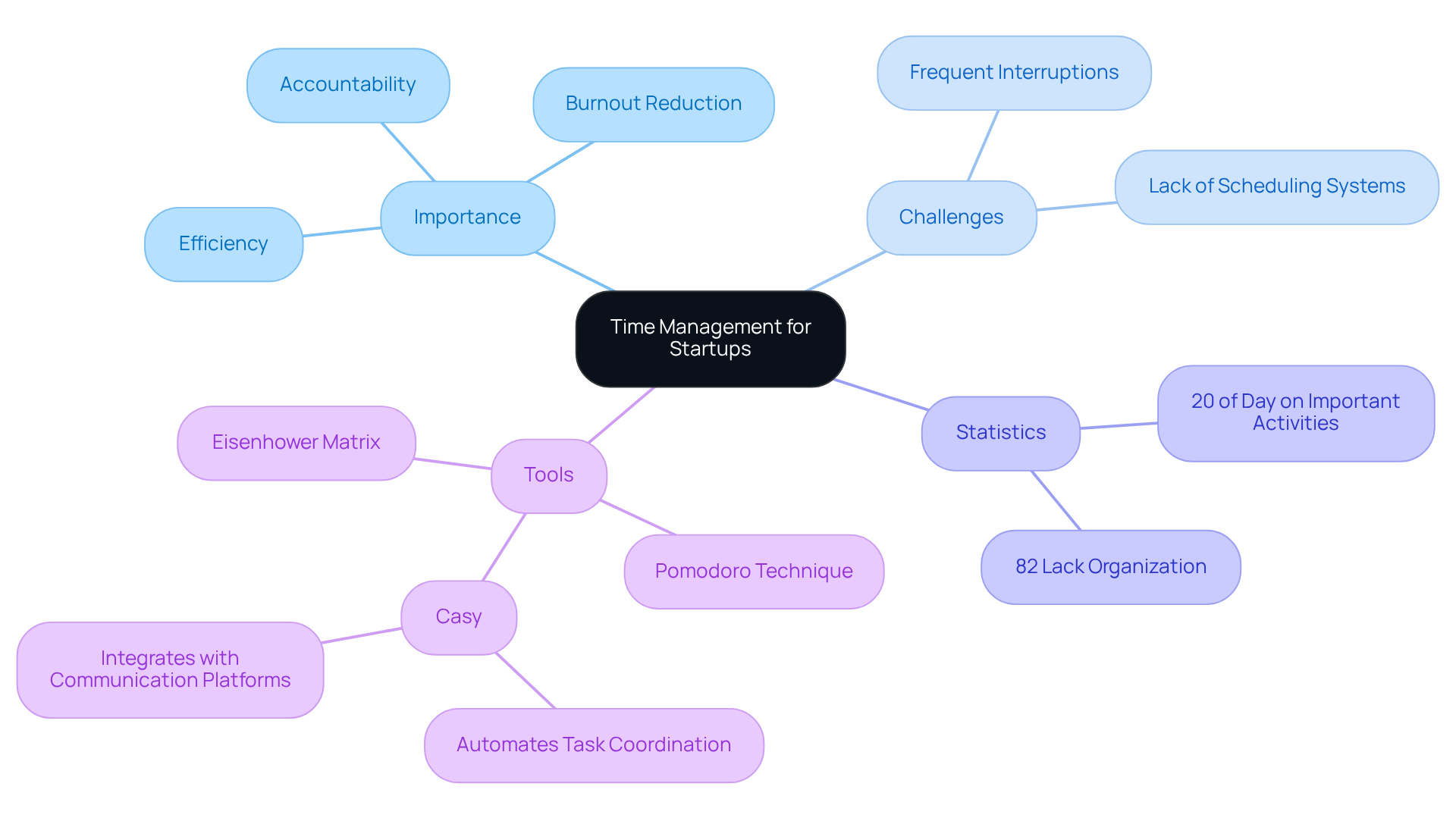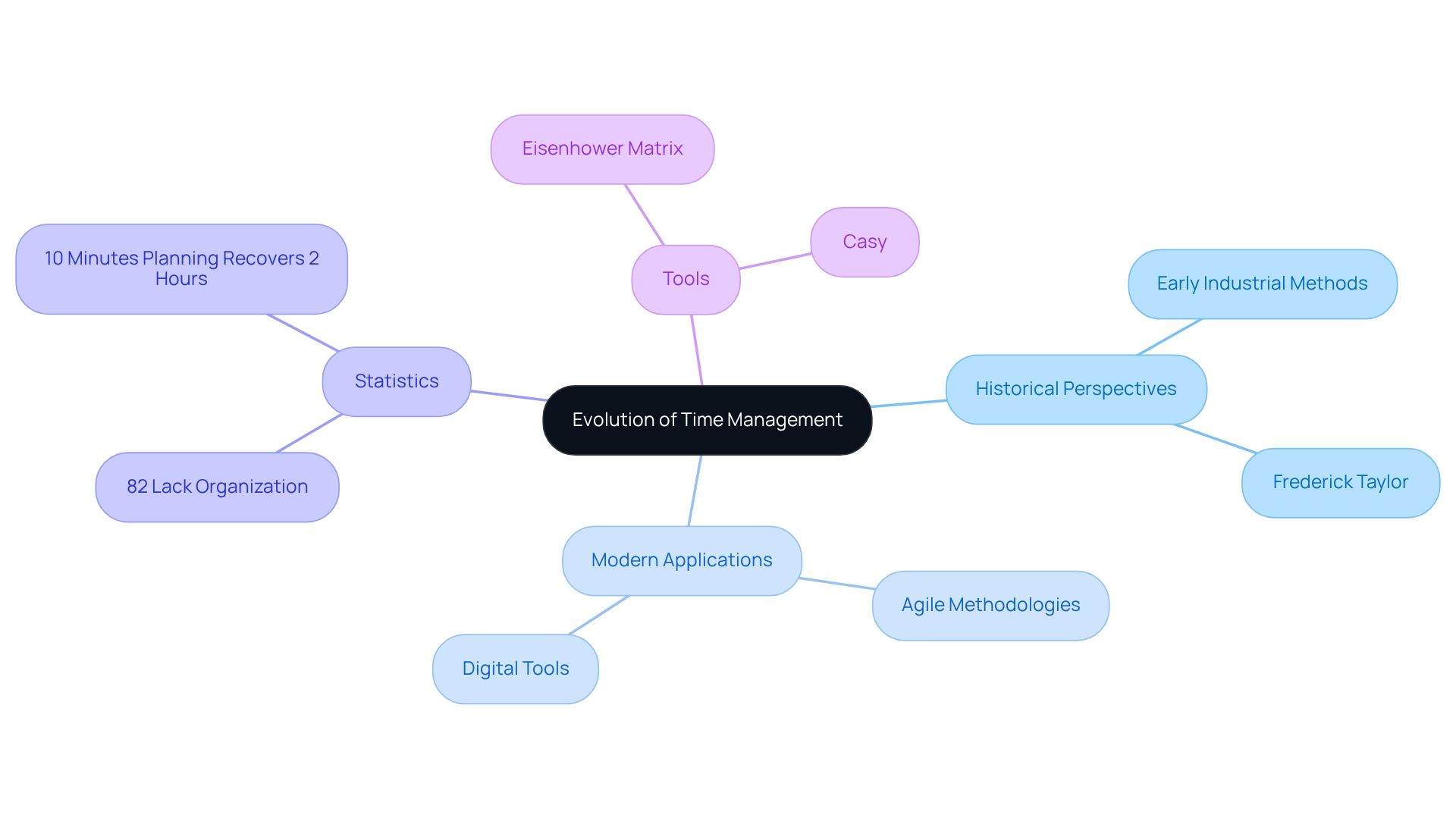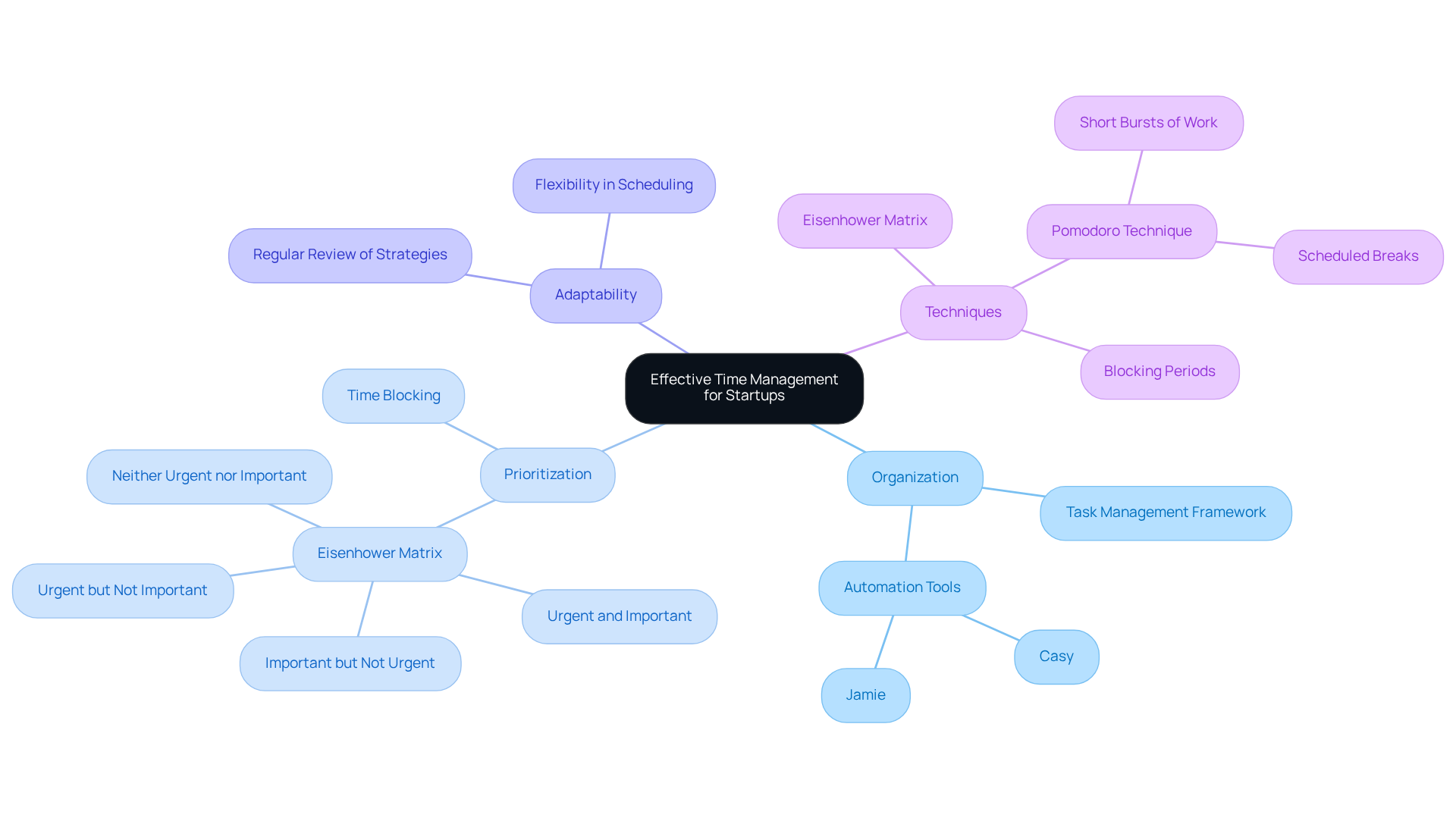Overview
Time management is essential for the success of startups, as it involves the organization of tasks to boost productivity, prioritize critical activities, and effectively manage limited resources. Have you considered how your scheduling practices impact your efficiency? Effective techniques, such as the Eisenhower Matrix and timeboxing, can significantly enhance operational efficiency, reduce costs, and allow startups to concentrate on high-impact activities crucial for growth. By implementing these strategies, founders can ensure that their focus remains on what truly drives success.
Introduction
Understanding the intricacies of time management is crucial for startups aiming to thrive in a competitive landscape. By mastering the art of scheduling, these emerging businesses can enhance productivity, streamline operations, and foster a culture of accountability among their teams.
However, with the challenges of constant interruptions and the pressure of tight deadlines, how can startups effectively harness time management strategies to drive their success?
This article delves into the core principles, techniques, and historical evolution of time management, revealing how startups can transform their approach to scheduling and unlock their full potential.
Defining Time Management: Core Concepts and Principles
Scheduling is a strategic process that illustrates what does time management mean by organizing and regulating the duration assigned to specific tasks. This encompasses a blend of principles, practices, and tools designed to help individuals and groups understand what does time management mean, prioritize activities, manage resources efficiently, and achieve their goals effectively. For startups, understanding what does time management mean is essential; it allows founders and their teams to enhance productivity while reducing stress and operational overhead. Key concepts include:
- Prioritization: Identifying the most critical tasks that align with business goals.
- Planning: Designating specific intervals for activities to ensure timely completion.
- Tracking Tools: Utilizing software and methodologies like the Eisenhower Matrix to monitor progress and manage workloads effectively.
Statistics reveal that 90% of individuals believe better organization of their schedules would boost their productivity, while 86% assert it would enhance their focus on tasks. In entrepreneurial environments, where agility and efficiency are paramount, effective scheduling can significantly impact success. Notably, 37% of employees cite unproductive meetings as the greatest expense to their organization, underscoring the need for efficient communication and task coordination. By implementing effective scheduling techniques, new businesses can reduce these costs and elevate overall productivity.
Effective management strategies in startups often incorporate methods such as timeboxing and strategic prioritization, highlighting what does time management mean as they can recover up to 20% of working hours. Timeboxing involves setting fixed durations for tasks, helping teams maintain focus and minimize the tendency to multitask. Experts emphasize that fostering a concentrated work environment by reducing distractions—such as excessive meetings and digital interruptions—can lead to substantial enhancements in team performance. By applying these principles, new businesses can navigate the complexities of growth while maintaining a clear trajectory toward their objectives.

The Importance of Time Management for Startups: Navigating Challenges and Opportunities
For new businesses, understanding what does time management mean goes beyond mere capability; it serves as a pivotal element in achieving success. Operating under tight deadlines and limited resources demands a concentrated focus on tasks that drive growth. Efficient scheduling helps new businesses understand what does time management mean as they navigate challenges such as shifting market demands, intense competition, and the urgent need for rapid innovation. By adopting structured scheduling techniques, new ventures can learn what does time management mean to significantly boost efficiency, minimize burnout, and cultivate a culture of accountability. This proactive strategy allows teams to zero in on high-impact activities that illustrate what does time management mean for achieving sustainable success.
As Demir Bentley, founder of Lifehack Method, aptly states, 'Only about 20% of the average working day is spent on activities that matter,' highlighting the critical nature of prioritization. Furthermore, with 82% of employees lacking an organized scheduling system, new businesses have a substantial opportunity for improvement by understanding what does time management mean. Startups that understand what does time management mean can implement effective scheduling strategies to reclaim up to 20% of their work hours, leading to marked enhancements in efficiency and productivity.
The challenges faced by new businesses in managing schedules are compounded by frequent interruptions—workers experience disruptions approximately 60 times a day, with each interruption requiring up to 25 minutes for complete recovery. This can severely hinder focus and efficiency. By leveraging tools like Casy, which automates task coordination and integrates seamlessly with communication platforms, startups can streamline workflows and alleviate the administrative load, empowering teams to concentrate on what truly matters.

The Evolution of Time Management: Historical Perspectives and Modern Applications
The concept of organizing schedules has evolved significantly over the years, transitioning from early industrial methods focused on efficiency to modern approaches that emphasize flexibility and adaptability. Traditionally, scheduling was rooted in production and labor effectiveness, with pioneers like Frederick Taylor advocating for systematic strategies in labor. Today, scheduling encompasses a broader range of strategies, including agile methodologies and digital tools that facilitate real-time collaboration. Startups can harness these contemporary applications to streamline workflows, improve communication, and cultivate a culture of continuous improvement.
Statistics reveal that 82% of individuals lack an organized scheduling system, leading to detrimental effects on productivity, including employee burnout, ineffective planning, elevated operational costs, and diminished innovation. This presents a substantial opportunity for startups to adopt effective practices. Furthermore, studies indicate that dedicating just 10 minutes to organizing daily activities can recover up to two hours of productive time, underscoring the importance of intentional scheduling.
Case studies further illustrate the benefits of modern scheduling techniques. For instance, businesses that implement structured scheduling methods report enhanced productivity by alleviating decision fatigue and minimizing anxiety. Additionally, the Eisenhower Matrix, recognized as one of the most effective tools for organizing priorities, empowers users to prioritize tasks efficiently, resulting in a greater sense of control over their work. Among various productivity frameworks, the Eisenhower Matrix stands out, highlighting its significance in contemporary scheduling.
Moreover, tools like Casy, which seamlessly integrate with chat platforms, address challenges such as manual updates and coordination needs, allowing teams to automate task creation and improve project oversight. This not only decreases administrative burden but also nurtures a culture of continuous improvement, enabling teams to concentrate on core activities. Notably, 20% of employees waste hours due to boredom, emphasizing the need for efficient resource strategies to enhance workflows and improve communication.
In conclusion, the evolution of scheduling reflects a shift towards more dynamic and adaptable practices, essential for the success of new businesses in today's fast-paced environment. By embracing these modern methodologies, startups can boost their productivity, foster innovation, and ultimately achieve their overarching objectives.

Key Characteristics and Techniques of Effective Time Management for Startups
Successful management of schedules for startups hinges on organization, prioritization, and adaptability. Techniques such as blocking periods, the Pomodoro Technique, and the Eisenhower Matrix empower teams to concentrate on high-impact tasks. For instance, scheduling blocks allows founders to allocate specific intervals for focused work, significantly enhancing productivity and minimizing distractions. The Pomodoro Technique, which involves working in short bursts followed by breaks, has been demonstrated to improve focus and efficiency; studies reveal it can help recover up to 20% of working time, making it a favored strategy among startups.
Moreover, leveraging technology through project management tools like Casy can automate work management and alleviate administrative burdens. Casy seamlessly integrates with chat platforms, collecting vital information to automatically generate assignments and set deadlines. This not only streamlines workflows but also enables teams to focus on core activities, effectively reducing the time spent on low-value tasks, which can consume nearly half of the workday. By alleviating the strain of manual updates and constant coordination, Casy enhances overall productivity.
The Eisenhower Matrix serves as another powerful tool for new businesses, aiding founders in categorizing tasks into four quadrants based on urgency and importance. By prioritizing urgent and significant tasks first, startups can address critical challenges while strategizing for long-term goals. Notably, 50% of individuals using the Eisenhower Matrix report a greater sense of control over their daily tasks. This structured approach to scheduling not only boosts productivity but also fosters a culture of accountability and transparency within teams.
Incorporating these techniques can yield substantial improvements in efficiency and responsiveness, ultimately propelling startup success in a competitive environment. Startup founders frequently encounter obstacles such as task prioritization, managing interruptions, and maintaining work-life balance, leading them to ask what does time management mean and making these strategies indispensable.

Conclusion
Effective time management is not merely a skill; it is a crucial foundation for the success of startups. By mastering the art of scheduling, prioritization, and resource allocation, new businesses can navigate the complexities of growth while enhancing productivity and reducing stress. Understanding the significance of time management allows startups to align their efforts with overarching goals, ensuring that every moment spent contributes to their success.
Throughout this article, key insights have been highlighted, emphasizing the importance of structured scheduling techniques such as:
- Timeboxing
- The Pomodoro Technique
- The Eisenhower Matrix
These tools not only help in prioritizing tasks but also in reclaiming precious work hours that can be redirected toward high-impact activities. Furthermore, leveraging technology through project management tools like Casy streamlines workflows and minimizes administrative burdens, ultimately fostering a culture of accountability and efficiency.
In a competitive landscape where every second counts, startups must recognize the transformative power of effective time management. By embracing these principles and techniques, entrepreneurs can significantly enhance their operational efficiency, reduce burnout, and cultivate an innovative environment. The journey toward sustainable success begins with a commitment to mastering time management, paving the way for growth and resilience in the face of challenges.
Frequently Asked Questions
What is time management?
Time management is the strategic process of organizing and regulating the duration assigned to specific tasks, incorporating principles, practices, and tools to help individuals and groups prioritize activities, manage resources efficiently, and achieve their goals.
Why is time management important for startups?
Time management is essential for startups as it enhances productivity, reduces stress, and lowers operational overhead, allowing founders and their teams to work more efficiently.
What are the key concepts of time management?
The key concepts of time management include prioritization, planning, and tracking tools. Prioritization involves identifying critical tasks, planning designates specific time intervals for activities, and tracking tools help monitor progress and manage workloads.
How does effective scheduling impact productivity?
Effective scheduling can significantly impact productivity, with statistics showing that 90% of individuals believe better organization of their schedules would boost productivity, and 86% assert it would enhance focus on tasks.
What are some common issues related to time management in organizations?
A common issue is unproductive meetings, which 37% of employees cite as the greatest expense to their organization, highlighting the need for efficient communication and task coordination.
What strategies can startups use for effective time management?
Startups can use strategies like timeboxing and strategic prioritization to recover up to 20% of working hours, maintain focus, and minimize multitasking.
What is timeboxing?
Timeboxing is a method that involves setting fixed durations for tasks, helping teams stay focused and reducing the likelihood of multitasking.
How can distractions affect team performance?
Excessive meetings and digital interruptions can distract teams, but by fostering a concentrated work environment and reducing these distractions, substantial enhancements in team performance can be achieved.




